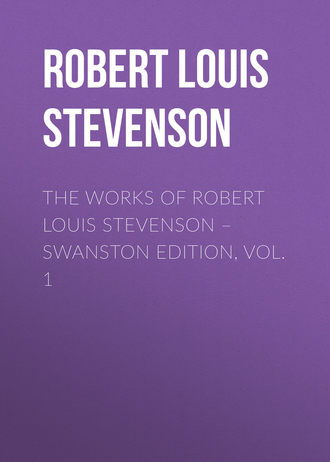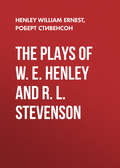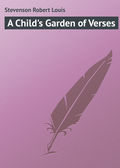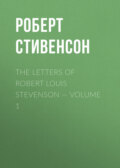
Роберт Льюис Стивенсон
The Works of Robert Louis Stevenson – Swanston Edition, Volume 1
Stevenson excited a good deal of odium among fiery Celts by his scoundrel Master of Lovat. There is no reason, as far as I am aware, to suppose that Simon was a scoundrel, but, as a figure in fiction, he is very firmly drawn. The abortive duel of Balfour with the Highland Ensign, who conceives high esteem of "Palfour," is in the author's best manner, as are the days of prison in that "unco place, the Bass," and he was justly proud of the wizard tale of Tod Lapraik. The bristling demeanour of Alan Breck and James Mor (a very gallant but distinctly unfortunate son of Rob Roy), seems a correct picture. Indeed, James Mor was correctly divined, probably from letters of his published in Scott's "Rob Roy." It does not appear that Stevenson ever saw a number of James's letters in the character of a spy (a spy who appears to be carefully bamboozling his employers), which exist in the Newcastle MSS. in the British Museum. But the James of these letters is the James of "Catriona." The scenes with the advocates of James of the Glens, at Inveraray, read as if they had been recorded in shorthand, at the moment. David himself is, of course, the Lowland prig he is meant to be, but Catriona, at last, was a moving heroine, though Stevenson, justly, preferred to her the beautiful Miss Grant, and entirely overcame the difficulty of making us realise her beauty. The Princess, in "Prince Otto," is a fair shadow, compared to Miss Grant, and Stevenson at last convinced most readers that if he had omitted the interest of womanhood, it was not from incompetence—though it may have been from diffidence.
At this time we used to receive letters from him not infrequently; he sent me the "Luck of Apemama," which he sacrilegiously purchased from its holder. This fetish, the palladium of the island, was in one point remarkable—a very ordinary shell in a perfectly new box of native make. Why it was thought "great medicine" and ignorantly worshipped, the pale-face student of magic and religion could not understand. However, it was the Luck of the island, and when it crossed the sea to Europe a pestilence of measles fell on the native population. There was no manifest connection of cause and effect.
Stevenson's letters to me were merely such notes as he might have written had we both been living within the four-mile radius; usually notes about books which he needed, always brightened with a quip and some original application of slang. Occasionally there were rhymes. One was about a lady:
"Who beckled, beckled, beckled gaily."
Another had the refrain:
"The dibs that take the islands
Are the dollars of Peru."
One long and lively piece was on the Achaean hero of a fantastic romance by Mr. Rider Haggard and myself: the Ithacan, the Stormer of the City. Stevenson exclaimed:
"Ye wily auld blackguard,
How far ye hae staggered,
Frae Homer to Haggard
And Lang."
How variously excellent he was as a letter-writer the readers of his correspondence know, and how vast, considering his labours and his health, that correspondence is! Often it is freakish, often it is serious, but except in some epistles of the period of his apprenticeship, it is never written as if he anticipated the publisher and the editor. Good examples are his letters to a reviewer, who, criticizing him without knowing him, wrote as if he were either an insensible athletic optimist, or a sufferer who was a poseur. "The fact is, consciously or not, you doubt my honesty.... Any brave man may make out a life which shall be happy for himself, and, by so being, beneficent to those about him. And if he fail, why should I hear him weeping?" Why, indeed? Think of Mr. Carlyle! "Did I groan loud, or did I groan low, Wackford?" said Mr. Squeers. Mr. Carlyle groaned loud, sometimes with fair reason. Stevenson did not groan at all. If he posed, if his silence was a pose, it was heroic. But his intellectual high spirits were almost invincible. If he had a pen in his hand, the follet of Molière rode it. Mr. Thomas Emmett, that famous Yorkshire cricketer, has spoken words of gold: "I was always happy as long as I was bowling." Stevenson, I think, was almost always happy when he was writing, when the instrument of his art was in his fingers.
Consider the deliberate and self-conscious glumness; the willful making the worst of things (in themselves pretty bad, I admit), that mark the novels of eminent moderns who thrive on their inexpensive pessimism, and have a name as Psychologues! Ohé, les Psychologues! Does anyone suppose that Stevenson could not have dipped his pencil in squalor and gloom, and psychology, and "oppositions of science falsely so-called," as St. Paul, in the spirit of prophecy, remarks? "Ugliness is only the prose of horror," he said. "It is when you are not able to write 'Macbeth' that you write 'Thérèse Raquin' … In any case, and under any fashion, the great man produces beauty, terror, and mirth, and the little man produces–" We know what he produces, and though his books may be praised as if the little man were a Sophocles up to date, he and his works are a weariness to think upon. In them is neither beauty, mirth, nor terror, except the terror of illimitable ennui.
None the less, I believe that the little men of woe are happy; are enjoying themselves, while they are writing, while they are doing their best to make the public comfortably miserable. If these authors were as candid as Stevenson they would admit that they enjoy their "merry days of desolation," and that the world is not such a bad place for them, after all. But perhaps before this truth can be accepted and confessed by these eminent practitioners in pessimism, a gleam of humour must arise on their darkness—and that is past praying for. There is a burden of a Scots song which, perhaps, may have sung itself in the ear of Louis, when life was at its darkest:
"And werena my heart licht I wad die!"
Having finished "Catriona," at about the age that Scott had when he wrote his first novel, "Waverley," Stevenson thought of "Weir of Hermiston," ("I thought of Mr. Pickwick," says Dickens with admirable simplicity), and fell to that work furiously, as was his wont when a great theme dawned on him. But soon, as usual, came the cold fit; his inspirations being intermittent for some untraced reason, physical or psychological. Possibly he foresaw the practical difficulty of his initial idea: that the Roman Father should sit on the bench of Scottish Themis and try his own son on a capital charge. This would not have been permitted to occur in Scotland, even when "the Fifteen" were first constituted into a Court. If humane emotions did not forbid, it must have been clear that no Scottish judge (they were not "kinless loons") would have permitted his son to be found guilty. Conceivably this damping circumstance occurred to Stevenson. He dropped, for a while, the hanging judge, and began "St. Ives" as a short story. It was now that, early in 1893, under an attack of hemorrhage, Stevenson dictated his tale to his stepdaughter, on his fingers, in the gesture alphabet of the dumb. Perhaps this feat is as marvelous as Scott's dictating "The Bride of Lammermoor," in tormentis, to Will Laidlaw.
We see how his maladies hung on Stevenson's flank, even in Samoa, where his health had so remarkably improved, and permitted to him unwonted activities. After a visit to Sydney, he took up "The Ebb-Tide" in collaboration with Mr. Osbourne, whose draft of the first chapters he warmly applauded. It is not one of his central successes. His pencil was dipped in moral gloom, but even to the odious Cockney scoundrel, Huish, his Shakespearian tolerance accorded the virtue of indomitable courage. He could not help filling the book full with his abundant vitality and his keen observation of the islands and the beachcombers. The thing, to use an obsolete piece of slang, is vécu. There were other projects, many of them, which dawned rosily, and faded into the grey; and there was the rich and copious correspondence dated from Vailima. His friends, no doubt, hearing of his good health, now and then, hoped to see his face again; the grouse on the hills of home were calling their eternal Come back! come back!
Stevenson, who himself could live contentedly on so little, was the most open-handed of men, the most liberal and cheerful of givers; and whether to Samoans in distressful times, or to others who sought his aid, his purse was never closed; while his hospitality was like Sir Walter's. Probably, in his hour of greatest success, he never was among "the best sellers." But any financial anxieties which may have beset him were assuaged, and his heart was greatly held up, by the success of the beautiful "Edinburgh Edition" of his works, conceived and carried out by the energy of his friend of old Edinburgh days, Mr. Charles Baxter.
His latest work was "Weir of Hermiston"; the plenitude of his genius shines in every page. He himself thought that this was his best work; so far as we can judge by the considerable fragment that exists, he was in the right. There is nothing immature, nothing here of the boy; he is approaching, in his tale, a fateful point of passion and disaster; his characters, especially the elder woman, the nurse, are entirely human, with no touch of caprice; they all live their separate lives in our memories. Then the end came. One moment of bewildered consciousness—then unconsciousness and death. He had written to me, some months before, a letter full of apprehensions of the fate of Scott and Swift; whether warned by some monitory experience, or whether he had merely chanced to be thinking of the two great men who outlived themselves. To him death had come almost as a friend in the fullness of his powers; there was no touch of weakness or decay, and he was mourned like a king by his Samoans, by his family, by all who had known him, and by many thousands who had never seen his face. There was mourning at home in Scotland (where we hoped against hope that the news was untrue), in England, in Europe, in America, in Australia and the Isles. He who had been such "a friendly writer," who had created for us so many friends in his characters, had made more friends for himself, friends more and more various in age, race, tastes, character, and temper, than any British writer, perhaps, since Dickens. He was taken from us untimely; broken was our strong hope in the future gifts of his genius, and there was a pain that does not attend the peaceful passing, in the fullness of years and wisdom and honour, of an immortal like Tennyson.
Any attempt by a contemporary to "place" Stevenson, to give him his "class" in English literature, would be a folly. The future must judge for itself, and, if we may estimate the taste of the future by that of the present, the reading public will not often look behind the most recent publications of its own day. But les délicats will look back on Stevenson as they now look back on Fielding, who, to my simple thinking, remains unsurpassed as a novelist; and as they turn to Lamb and Hazlitt as essayists. The poet is, of course, at his best immortal—time cannot stale Beowulf, or the nameless lyrists of the fourteenth century, or Chaucer, or Spenser, and so with the rest, la mort n'y mord. But it is as a writer of prose that Stevenson must be remembered. If he is not the master British essayist of the later nineteenth century, I really cannot imagine who is to be preferred to him. His vivacity, vitality, his original reflections on life, his personal and fascinating style, claim for him the crown. Nobody, perhaps, places him beside Lamb, and he would not have dreamed of being equaled in renown with Hazlitt, while he is, I conceive, more generally sympathetic than Mr. Pater, whose place is apart, whose province is entirely his own. When we think of Stevenson as a novelist, there is this conspicuous drawback, that he never did write a novel on characters and conditions in the mid-stream of the life that was contemporary with himself. He does not compete, therefore, with Thackeray and Dickens, Mr. Hardy and Mr. Meredith, but Scott is also no competitor.
"St. Ronan's Well" is Scott's only novel that deals with precisely contemporary life, and "St. Ronan's Well" is a kind of backwater; the story of a remote contemporary watering-place, of local squireens, and of a tragedy, mangled in deference to James Ballantyne. Scott did not often care to trust himself out of the last echoes of "the pipes that played for Charlie," and though his knowledge of contemporary life was infinitely wider than Stevenson's, we see many good reasons for his abstention from use of his knowledge. For example, it is obvious that he could not attempt a romance of the War in the Peninsula, and of life in London, let us say, while Wellington was holding Torres Vedras. Even among Stevenson's abandoned projects, there is not, I think, one which deals with English society in the 'eighties. His health and his fugitive life imposed on him those limitations against which his taste did not rebel, for his taste led him to the past, and to adventure in a present not English, but exotic. He is not in the same field, so to speak, as Richardson and Fielding, Dickens and Thackeray, Mr. Hardy and Mr. Meredith; and their field, the great living world of their time, is what the general reader wants the novelist to deal with as he best may.
Shakespeare, to be sure, wrote no drama on Elizabethan times in England; we must go to Heywood and Ben Jonson for the drama of his contemporary world. Many circumstances caused Stevenson, when at his best, to be a historical novelist, and he is, since Scott and Thackeray, the best historical novelist whom we have.
Add to all this his notable eminence in tales of shorter scope; in essays, whether on life or on literature, so various and original, so graceful and so strong; add the fantasies of his fables, and remember that almost all he did is good—and we must, I think, give to Stevenson a very high place in the literature of his century.
Of his verse I have hitherto said nothing, and I do not think that if he had written verse alone, his place would have been highly distinguished. His "Child's Garden of Verse" is a little masterpiece in a genre of his own invention. His verses in Scots are full of humour, and he had a complete mastery of the old Northern English of the Lowlands. His more serious poems often contain ideas and the expression of moods which he handled better, I think, in his prose. Even the story of "Ticonderoga" I would rather have received from him in prose than in his ballad measure. Possibly I am prejudiced a little by his willfulness in giving to a Cameron the part of the generous hero; true to his word, in spite of the desire to avenge a brother, and of the thrice-repeated monition of the dead. It is not that I grudge any glory to the children of Lochiel, a clan, in General Wolfe's opinion, the bravest where all were brave, a clan of constant and boundless loyalty. But in Stevenson's own note to his poem, the Cameron "swears by his sword and Ben Cruachan," and "Cruachan" is a slogan of the Campbells. The hero, as a matter of fact, was a Campbell of Inverawe. "Between the name of Cameron and that of Campbell the Muse will never hesitate," says Stevenson. One name means "Wry mouth," the other "Crooked nose"; so far, the Muse has a poor choice! But the tale is a tale of the Campbells, of Clan Diarmaid, and the Muse must adhere to the historic truth.
This essay must not close on a difference of opinion concerning historical events—a jarring note.
There are points enough in Stevenson's character and opinions which I have not touched; such as his religious views. He never mentioned the topic of religion in my hearing; it is to his printed words that the reader must turn, and he cannot but perceive that Stevenson's was a deeply religious nature. With his faith, whatever its tenets may have been, was implicated his uneasily active conscience; his sense of duty. This appears to have directed his life; and was practically the same thing as his sense of honour. Honour, I conceive, is, in a phrase of Aristotle's, duty "with a bloom on it."
Readers of his Letters, and of his Biography by his cousin, Mr. Balfour; readers of his essays, and of his novels, must see that he was keenly interested in cases of conscience; in the right course to steer in an apparent conflict of duties. To say that his theory of the right course, in a hypothetical instance, was always the same as my own would be to abuse the confidence of the reader. As Preston-grange observes: "I would never charge myself with Mr. David's conscience; and if you could cast some part of it (as you went by) in a moss bog, you would find yourself to ride much easier without it"; and not, perhaps, always in the wrong direction. There is a case of conscience in "The Wrecker," something about opium-smuggling, and the conscience of Mr. Loudon Dodd (a truly Balfourian character), which I have studied, aided by other casuists, for a summer's day. We never could agree as to what the case really was, as to what was the moral issue.
Casuistry may not be my strong point. I have found myself between no less authorities than a Chancellor of England and a learned Jesuit, both of whom, I thought, would certainly accept my view of a very unusual case of conduct. A certain cleric, in his ecclesiastical duties, happened to overhear an automatically uttered remark by another person; who never meant to speak or to be overheard. The cleric acted on this information, with results distressing to a pair of true lovers. I maintained that he did wrong. "There was no appeal," I said, "to the umpire. Nobody in the field asked 'How's that?'" But the Chancellor and the learned Jesuit backed the clergyman.
Now, I never knew for certain how "Mr. David's conscience" would decide, but I think he would have been with me on this occasion, and with the Rules of the Game.
There was a very pleasant trait in Stevenson's character which, perhaps, does not display itself in most of his writings; his great affection for children. In "A Child's Garden of Verse," delightful as it is, and not to be read without "a great inclination to cry," the child is himself, the child "that is gone." But, in an early letter, he writes: "Kids is what is the matter with me … Children are too good to be true." He had a natural infatuation, so to say, for children as children, which many men of the pen overcome with no apparent difficulty. He could not overcome it; little boys and girls were his delight, and he was theirs. At Molokai, the Leper Island, he played croquet with the little girls; refusing to wear gloves, lest he should remind them of their condition. Sensitive and weak in body as he was, Nelson was not more fearless. It was equally characteristic of another quality of his, the open hand, that he gave a grand piano to these leper children.
He says:
"But the nearest friends are the auldest friends,
And the grave's the place to seek them."
Among the nearest and the oldest friends of his I never was, but to few friends, nearer and older, does my desiderium go back so frequently; simply because almost every day brings something newly learned or known, which would have appealed most to his unequaled breadth of knowledge and interest and sympathy.
ANDREW LANG.
AN INLAND VOYAGE
"Thus sang they in the English boat."
MARVELL.
DEDICATION
TO
SIR WALTER GRINDLAY SIMPSON, BART
My dear "Cigarette,"
It was enough that you should have shared so liberally in the rains and portages of our voyage; that you should have had so hard a paddle to recover the derelict "Arethusa" on the flooded Oise: and that you should thenceforth have piloted a mere wreck of mankind to Origny Sainte-Benoîte and a supper so eagerly desired. It was perhaps more than enough, as you once somewhat piteously complained, that I should have set down all the strong language to you, and kept the appropriate reflections for myself. I could not in decency expose you to share the disgrace of another and more public shipwreck. But now that this voyage of ours is going into a cheap edition, that peril, we shall hope, is at an end, and I may put your name on the burgee.
But I cannot pause till I have lamented the fate of our two ships. That, sir, was not a fortunate day when we projected the possession of a canal barge; it was not a fortunate day when we shared our daydream with the most hopeful of daydreamers. For a while, indeed, the world looked smilingly. The barge was procured and christened, and as the "Eleven Thousand Virgins of Cologne," lay for some months, the admired of all admirers, in a pleasant river and under the walls of an ancient town. M. Mattras, the accomplished carpenter of Moret, had made her a centre of emulous labour; and you will not have forgotten the amount of sweet champagne consumed in the inn at the bridge end, to give zeal to the workmen and speed to the work. On the financial aspect I would not willingly dwell. The "Eleven Thousand Virgins of Cologne" rotted in the stream where she was beautified. She felt not the impulse of the breeze; she was never harnessed to the patent track-horse. And when at length she was sold, by the indignant carpenter of Moret, there were sold along with her the "Arethusa" and the "Cigarette", she of cedar, she, as we knew so keenly on a portage, of solid-hearted English oak. Now these historic vessels fly the tricolour and are known by new and alien names.
R. L. S.







